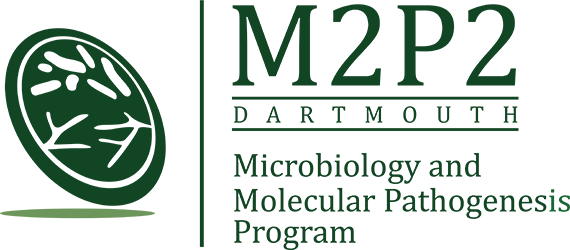M2P2 is a vibrant community of approximately 60 members focused on research and training in the areas of microbiology and microbe-host interactions. M2P2 is made up of…
Graduate Students
M2P2 provides graduate students with broad training in areas relating to microbial biology, pathogenesis, microbe-microbe interactions, and microbial association with human hosts. Dartmouth graduate students can become part of the M2P2 program simply by participating in M2P2 activities-nothing else is required!
Most M2P2 graduate students join M2P2 labs through the Molecular and Cellular Biology Graduate Program (MCB); other Dartmouth graduate programs represented among M2P2 students include the Graduate Program in Quantitative Biosciences (QBS) or PhD programs in Chemistry, EEES (Ecology, Environment, Evolution and Society), or the Thayer School of Engineering. More about training M2P2 graduate students receive can be found here.
Postdocs
There is a dynamic community of post-docs in M2P2 labs. Past M2P2 post-doc trainees have gone on to lead academic and industry groups, or work in diverse areas including biotechnology, patent law, consulting, or the non-profit sector. M2P2 post-docs have opportunities to speak in different venues and to participate in joint lab meetings, the retreat, and professional development activities.
M2P2 post-docs participate in a Post-Doc Seminar Series in which post-docs invite a post-doc from another institution to give back-to-back talks on related topics to help trainees build colleague networks. Post-docs often participate in grant writing groups, R club to build programming expertise, and get support for travel to meetings. To apply for a postdoctoral position, contact faculty members directly.
Staff
M2P2 faculty, students and post-docs receive tremendous support from both scientific and administrative staff. The BioMT cores aid students in protein purification and imaging, genome sequencing, transcriptomics and single cell sequencing is supported by the core.
Bioinformatics experts run a weekly R club to help students become proficient in programming and computational analyses of datasets. The Genomics Shared Resource and the Trace Metals Core provides customized support for students, post-docs and trainees for their research. In addition, technicians in M2P2 labs play integral roles in many research projects and participate in many M2P2 activities.
Faculty
M2P2 faculty come from diverse departments including Microbiology & Immunology, Biochemistry & Cell Biology, Biological Sciences, Medicine, Chemistry, and Earth & Planetary Science. The faculty attend all M2P2 events including the retreat, M2P2 Joint Lab Meeting, and social events throughout the year.
One of the strengths of the M2P2 program is the inclusion of groups with expertise in diverse areas including: molecular genetics analysis of bacterial, fungal, parasitic, and viral pathogenesis, signaling events in host-pathogen interactions, antibiotic resistance strategies and development of new drugs or therapeutic regimes, microbial genomics and community analysis, host interactions with bacteria, fungi, or viruses during sustained infection, the human microbiome, and therapeutic vaccine design.
Undergraduates
Dartmouth undergrads often work in M2P2 labs and make important contributions to M2P2 research under the mentorship of M2P2 graduate students and post-docs. Undergrads often get fellowships for research, many work in labs for multiple terms generating work that leads to publications, and their work in the lab not only advances science but can be a useful experience for future endeavors.

